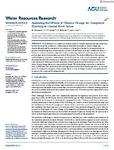Assessing the Effects of Climate Change on Compound Flooding in Coastal River Areas

Ver/
Use este enlace para citar
http://hdl.handle.net/2183/29732
A non ser que se indique outra cousa, a licenza do ítem descríbese como Atribución-NoComercial-SinDerivadas 4.0 Internacional
Coleccións
- Investigación (ETSECCP) [826]
Metadatos
Mostrar o rexistro completo do ítemTítulo
Assessing the Effects of Climate Change on Compound Flooding in Coastal River AreasData
2021Cita bibliográfica
Bermúdez, M., Farfán, J. F., Willems, P., & Cea, L. (2021). Assessing the effects of climate change on compound flooding in coastal river areas. Water Resources Research, 57, e2020WR029321. https://doi.org/10.1029/2020WR029321
Resumo
[Abstract] Flood assessment in coastal river areas is subject to complex dependencies and interactions between flood drivers. In addition, coastal areas are especially vulnerable to climate change, and thus its effects should be considered in the evaluation of future flood hazard. In the present study, we propose a methodology for a robust evaluation of historical and future flooding in coastal river areas. It follows a continuous simulation approach in which a hydrologic-hydraulic modeling cascade is run for several years, driven by a simultaneous series of flood drivers. The method differs from other existing methodologies in: (a) jointly considering the relevant flood drivers, both coastal and inland, together with their dependencies and interactions, to represent the simultaneous occurrence of extreme water levels correctly, and (b) obtaining local-scale physically consistent projections of flood drivers to account for future climate change effects on compound flood hazard. The methodology is tested for a coastal river reach in NW Spain. The results show that, although mean sea level rise is usually expected to be the main driver of increased flood hazard, climate change effects on river discharge can play a very significant role in regions with compound flooding potential.
Palabras chave
Compound flooding
Climate change effect
Sea level
River discharge
Climate change effect
Sea level
River discharge
Versión do editor
Dereitos
Atribución-NoComercial-SinDerivadas 4.0 Internacional






